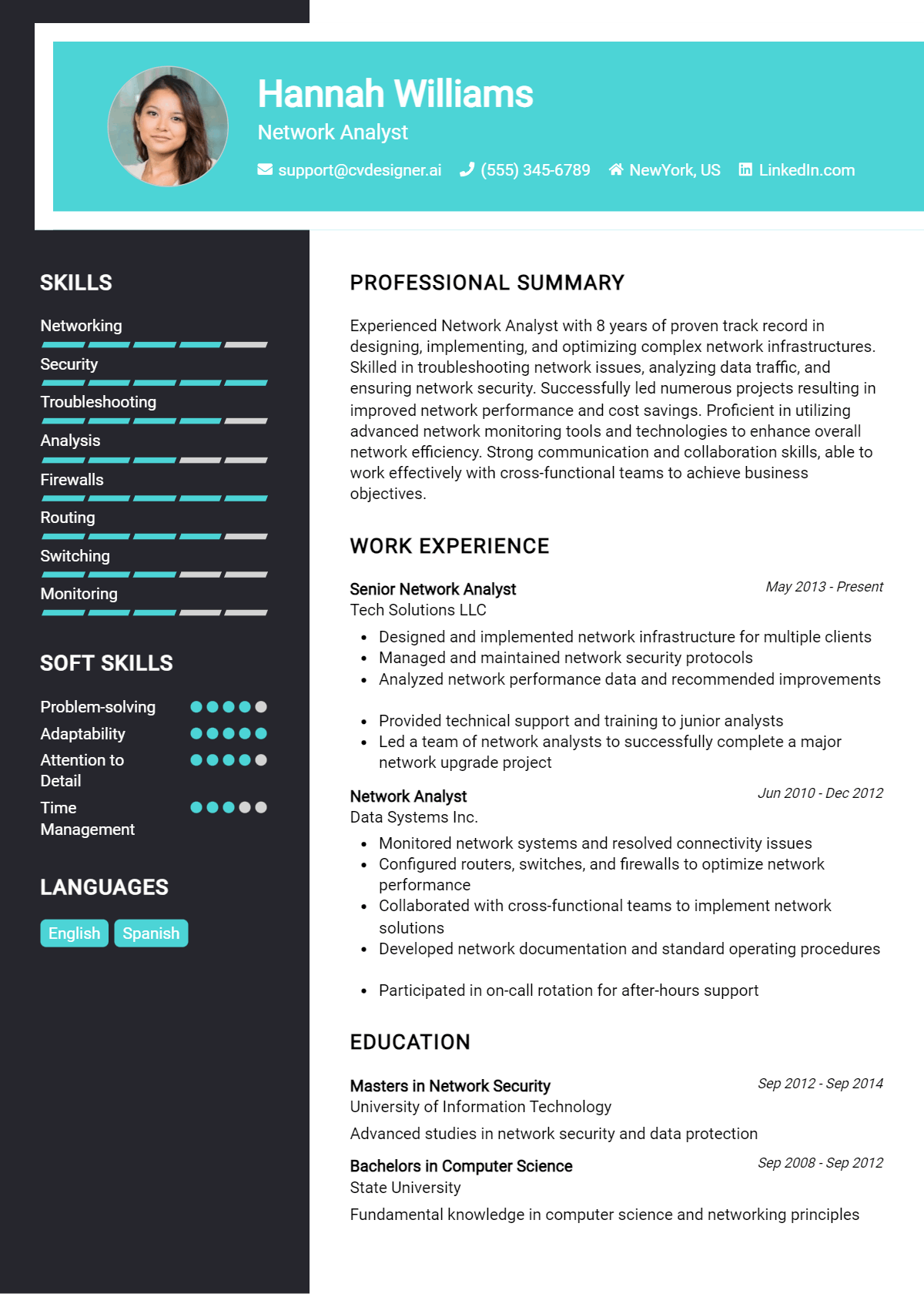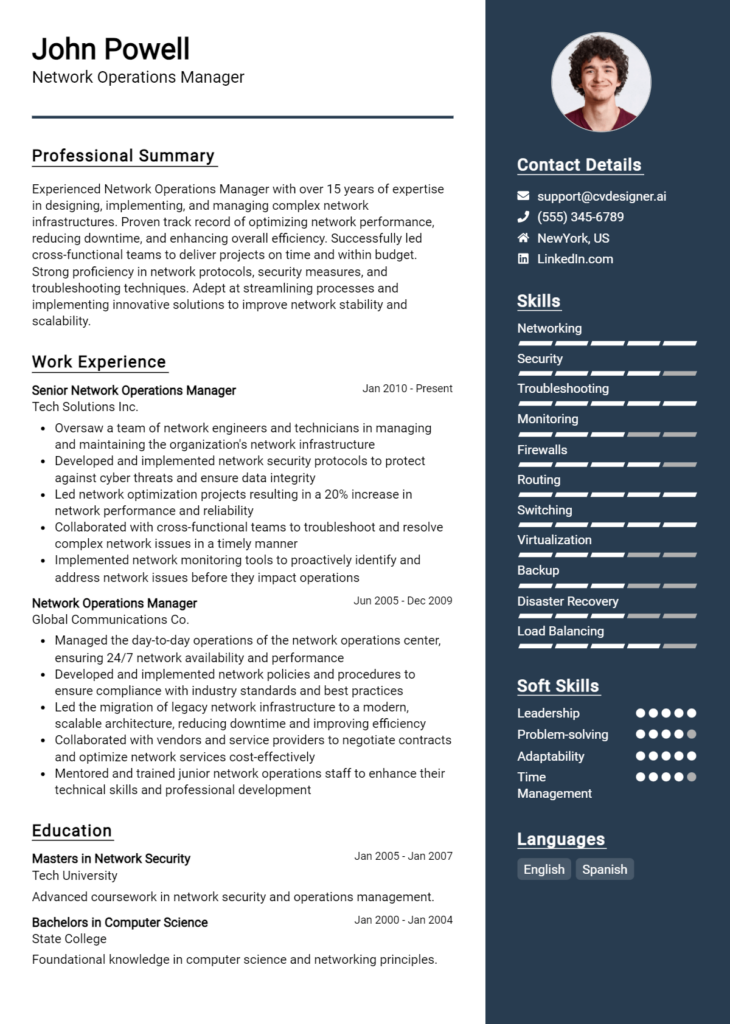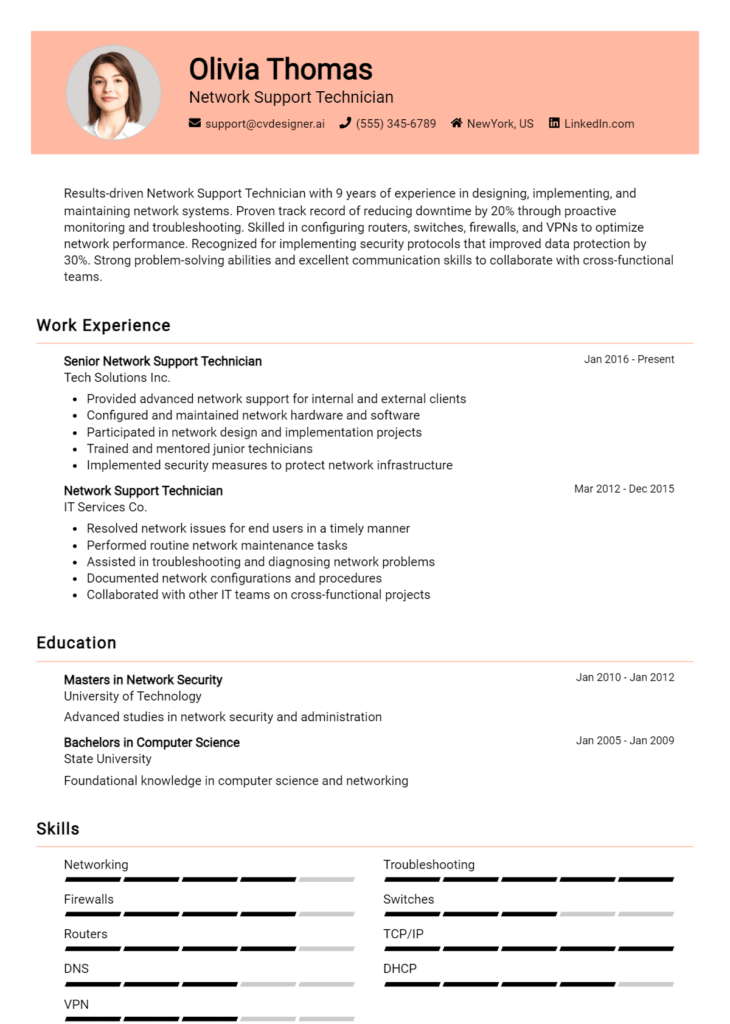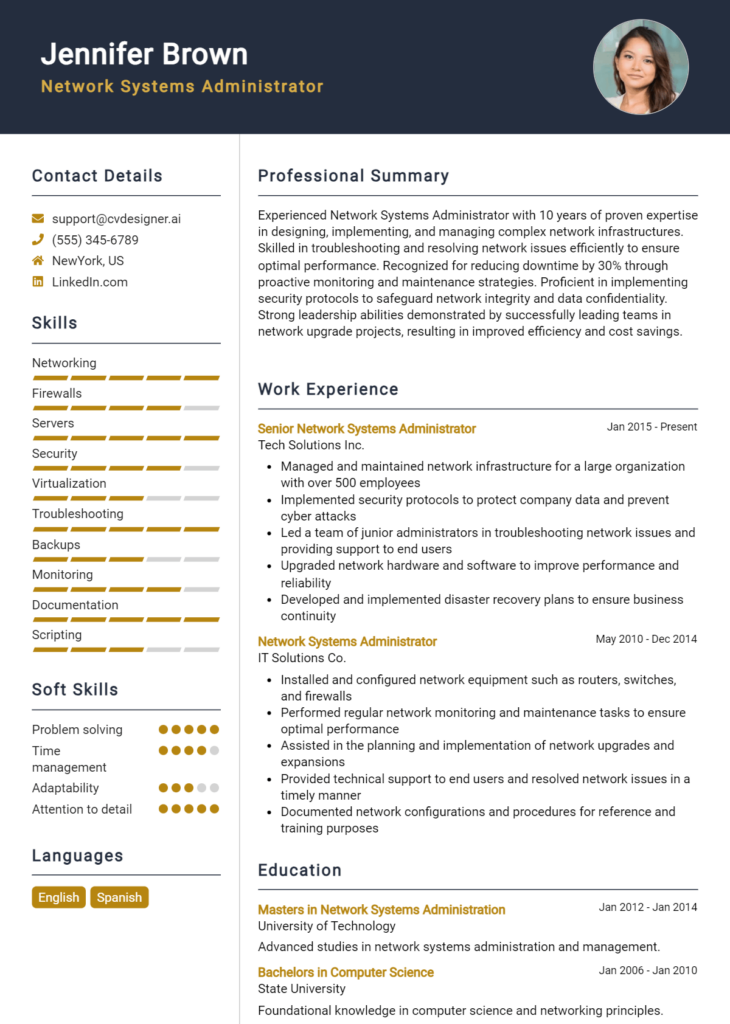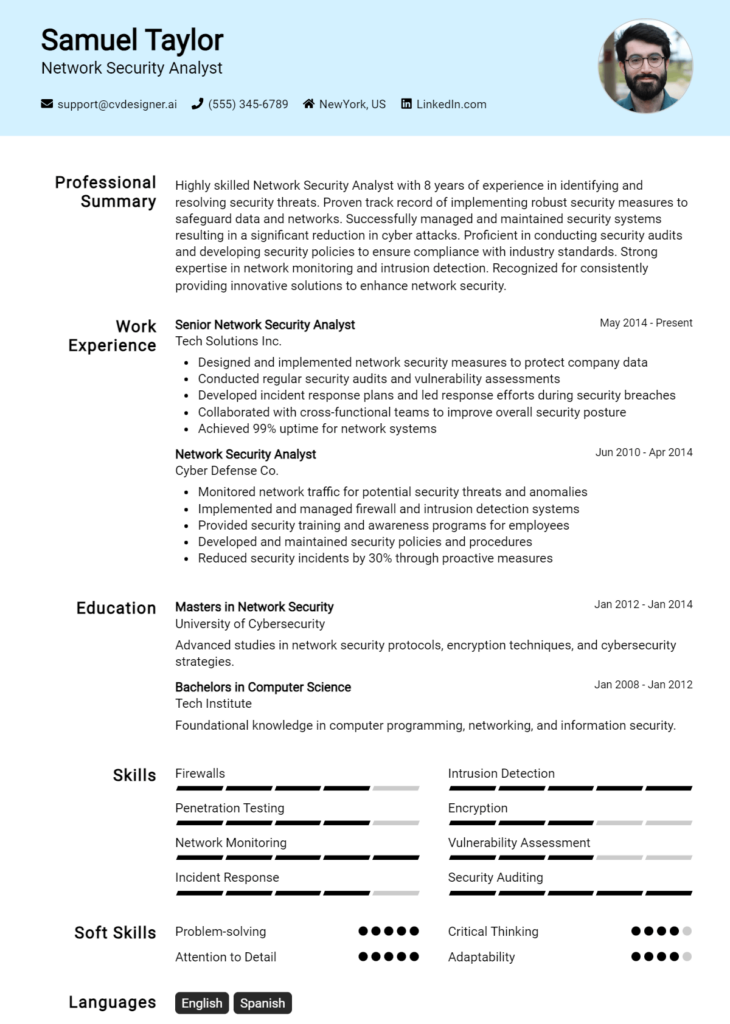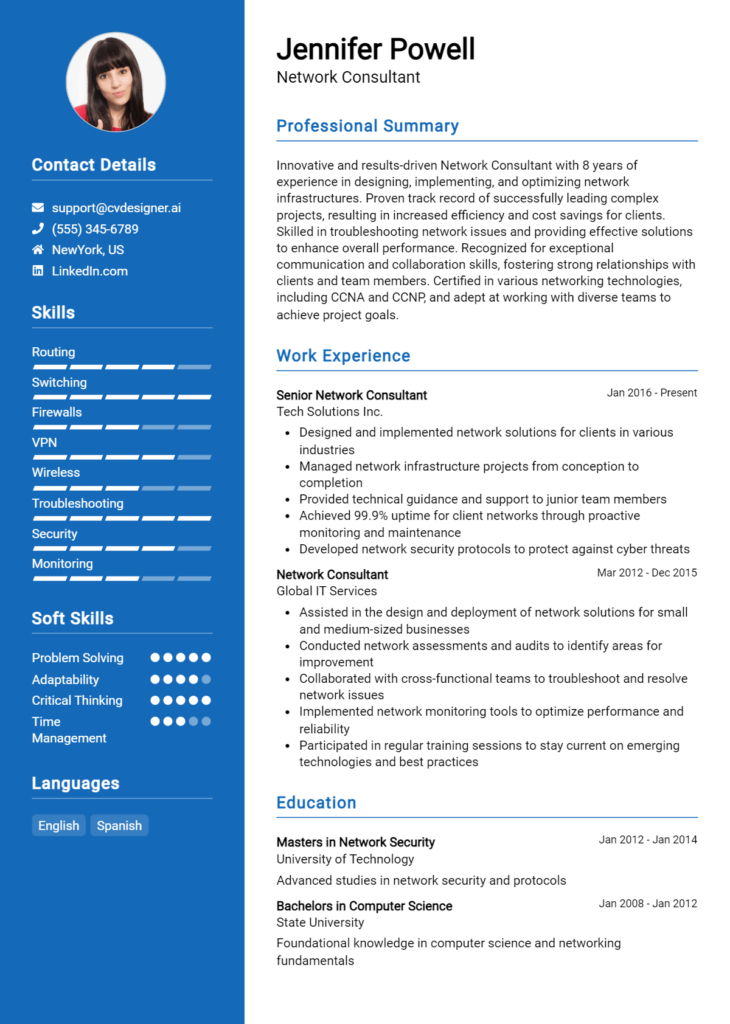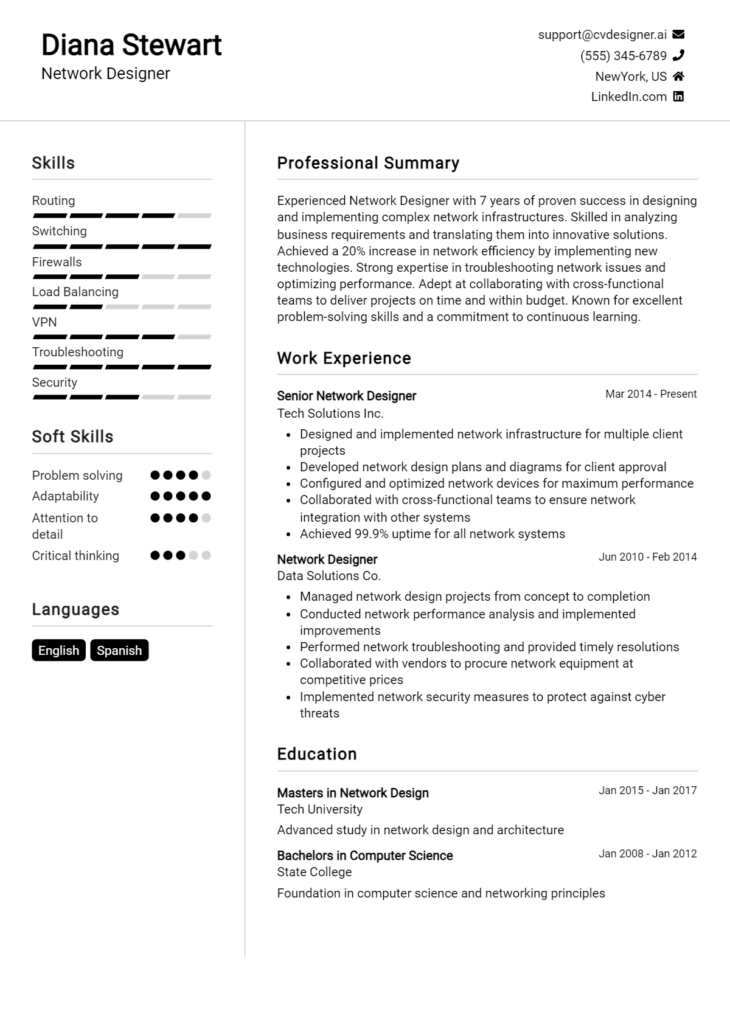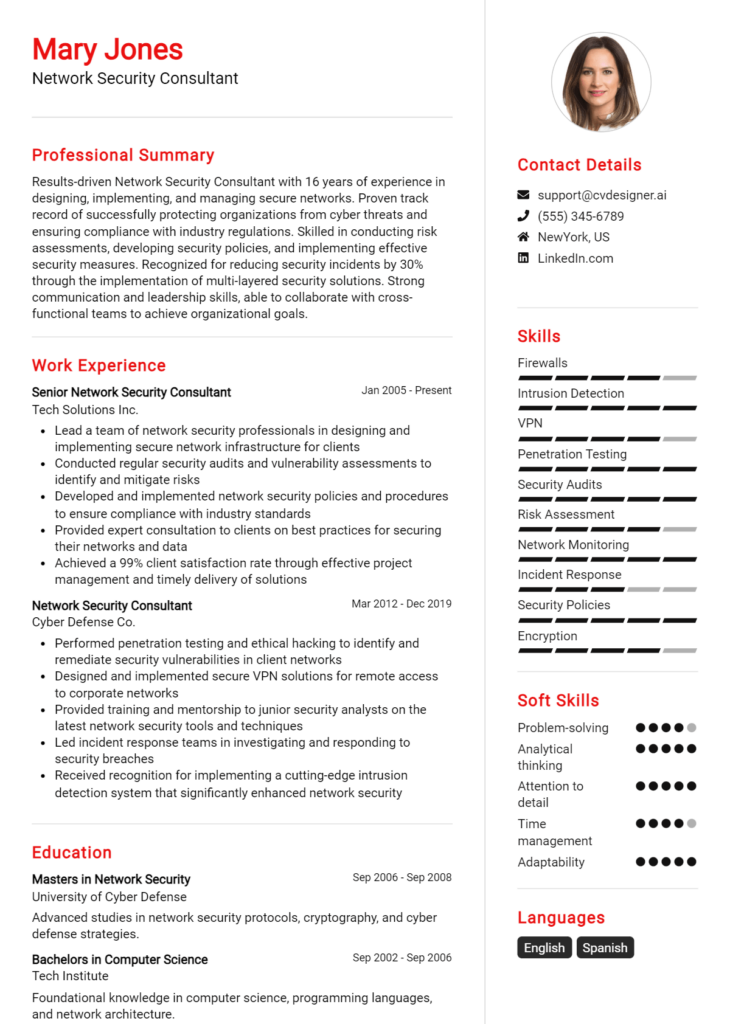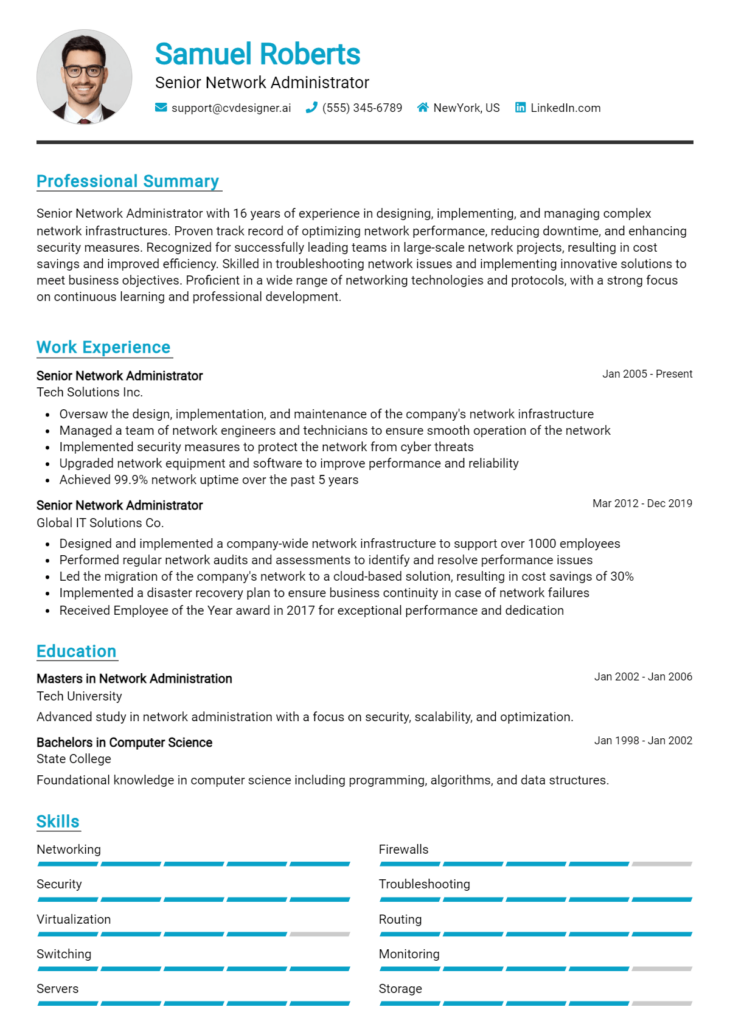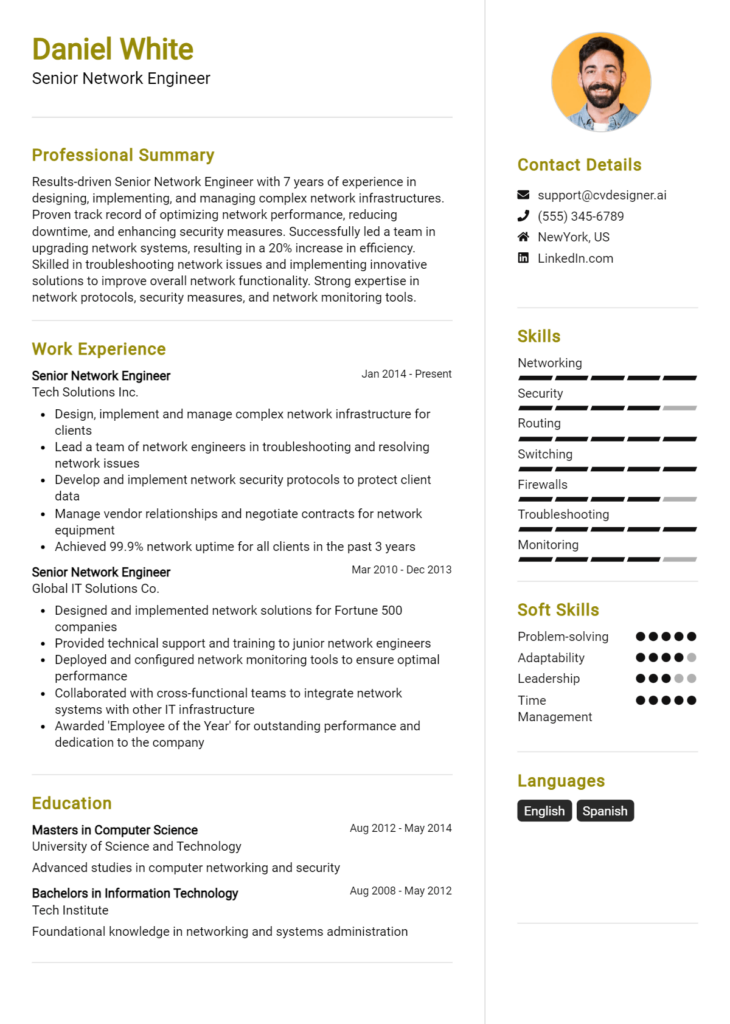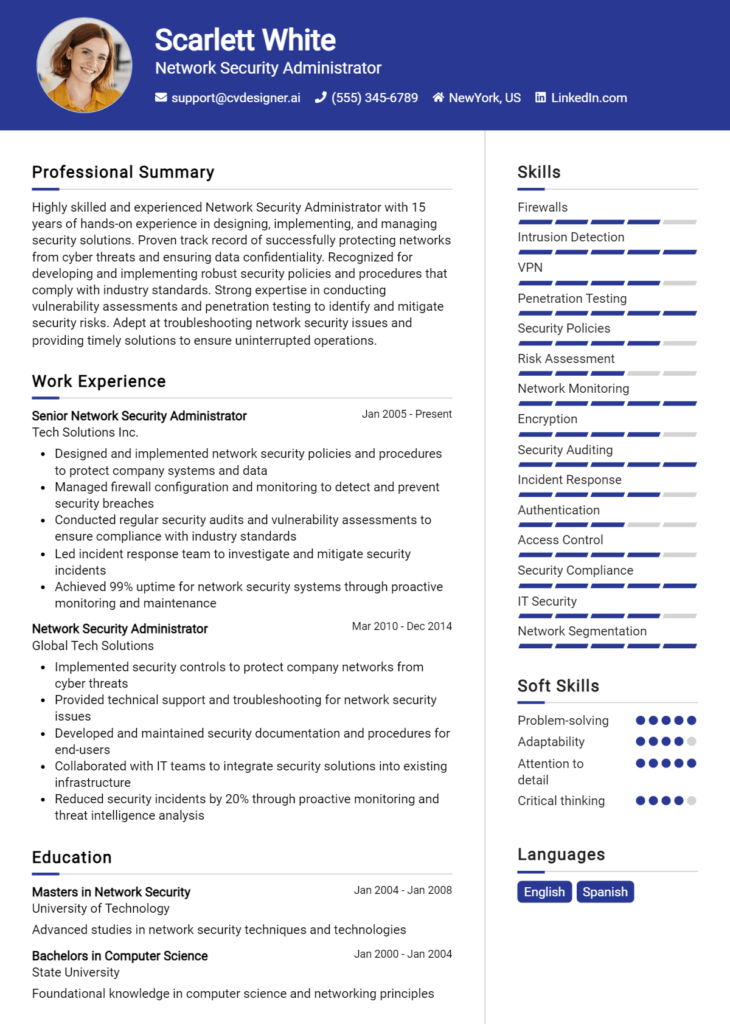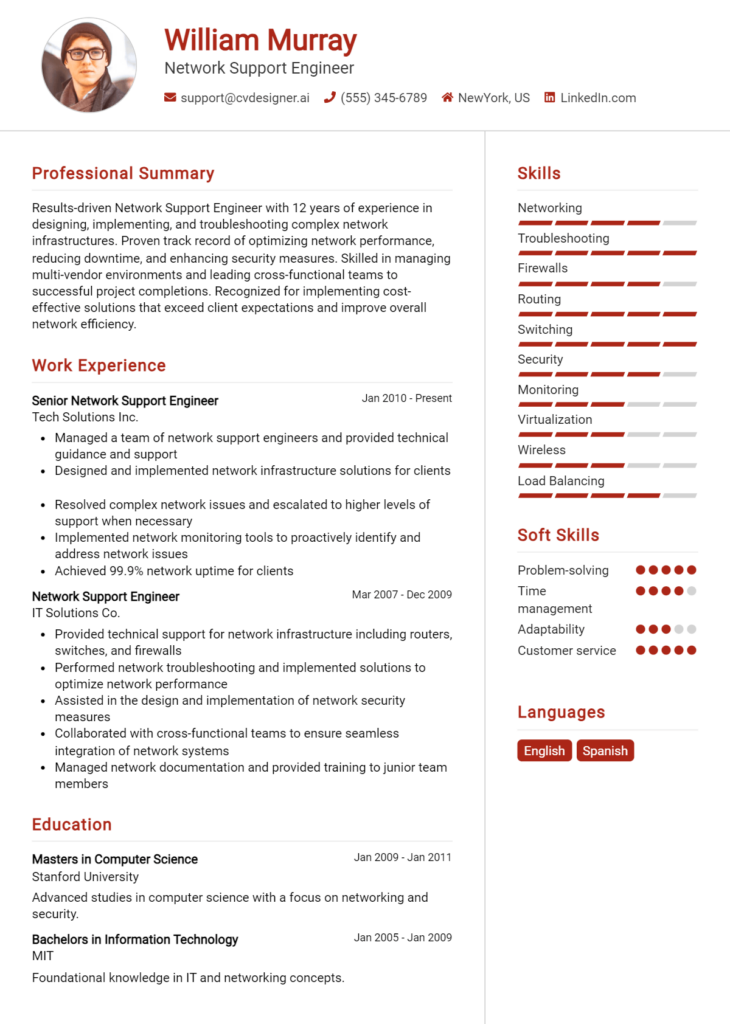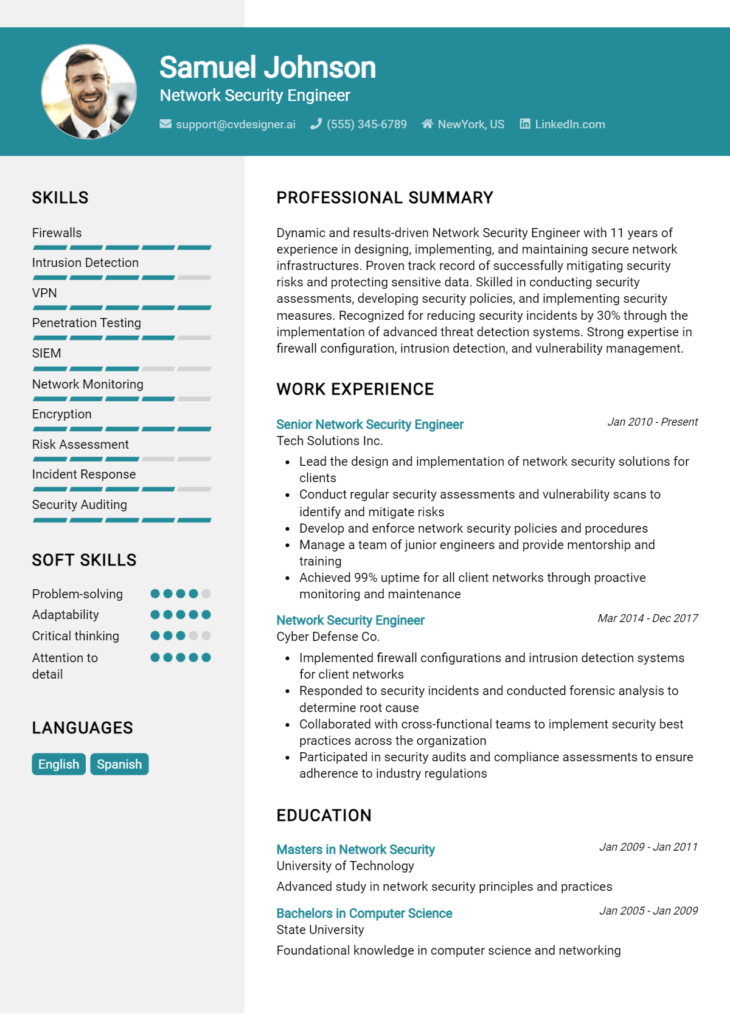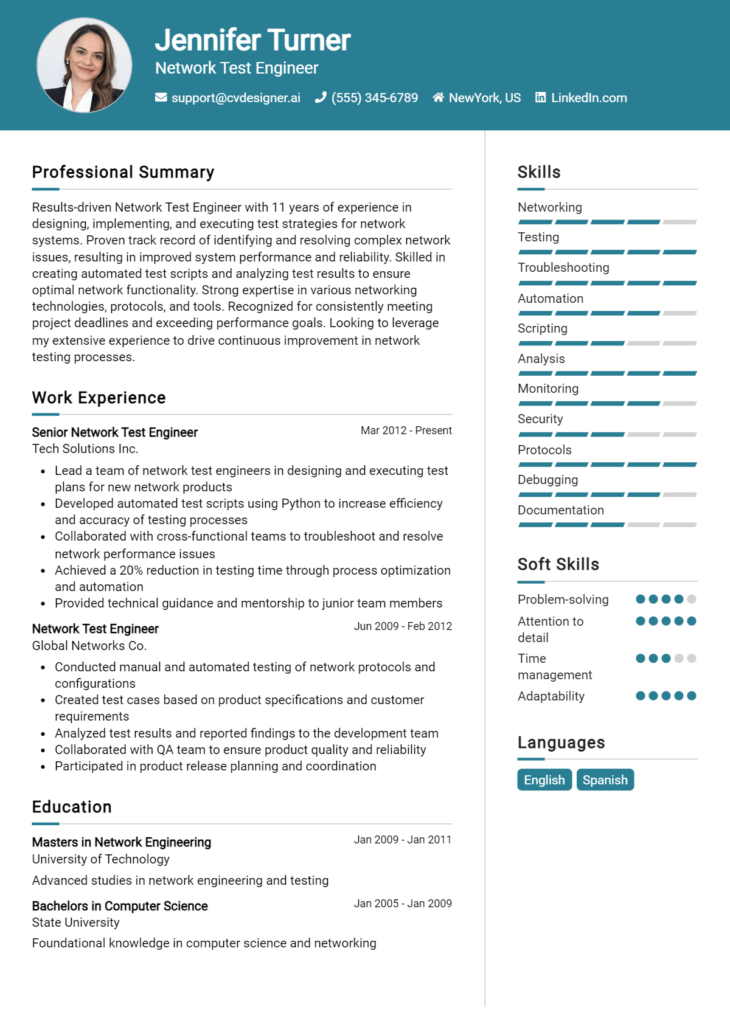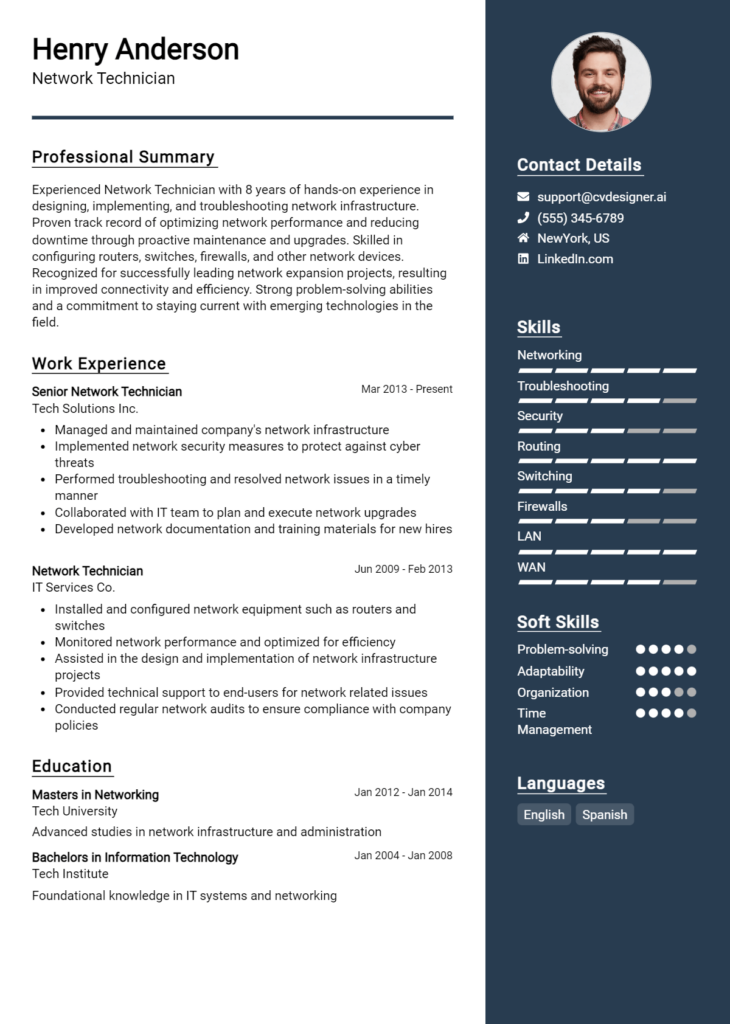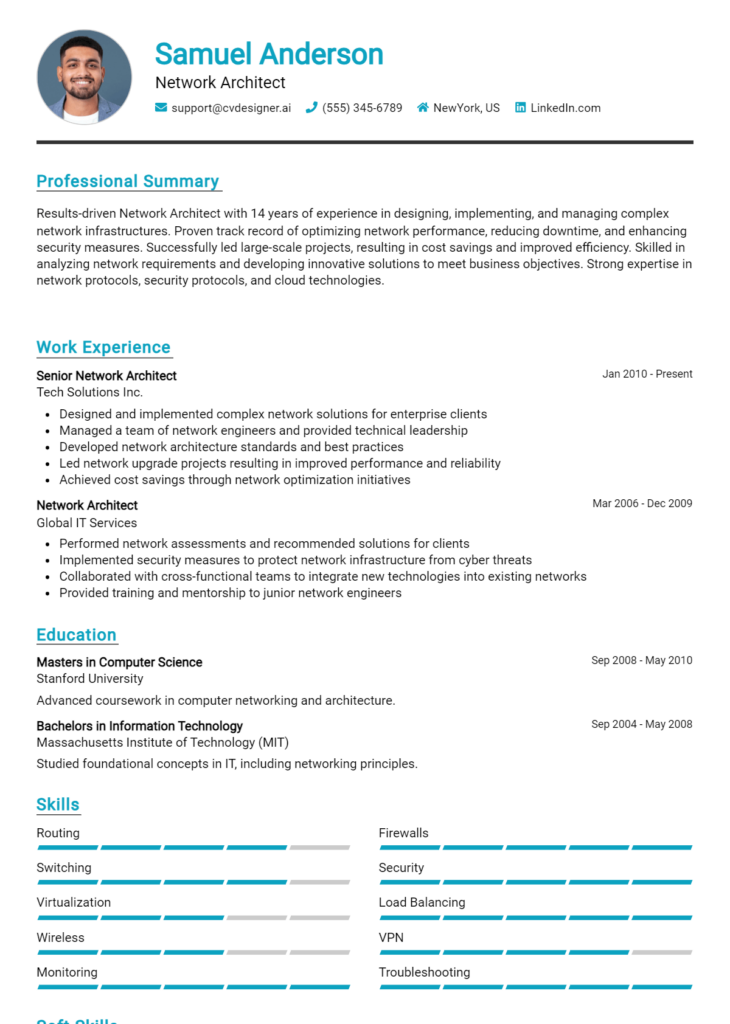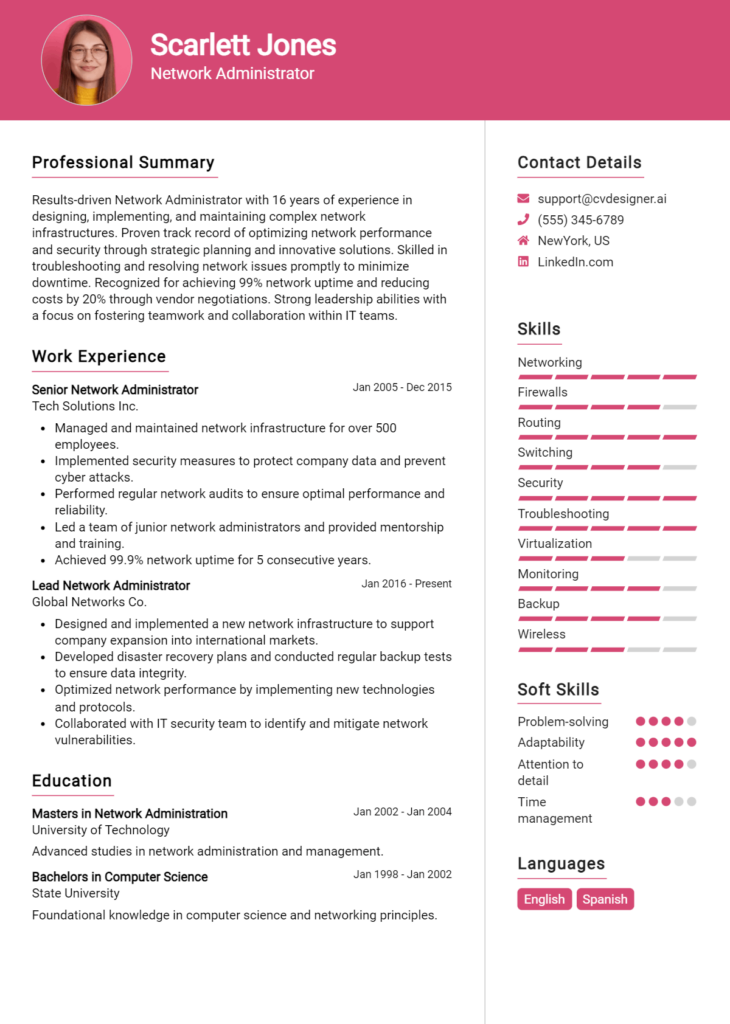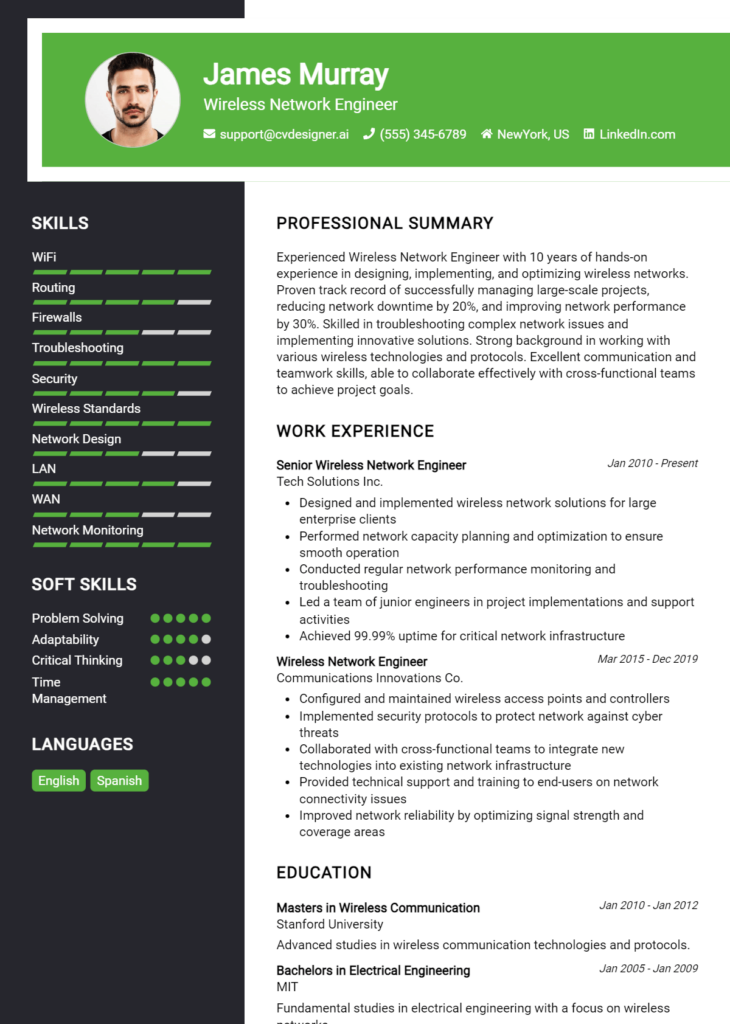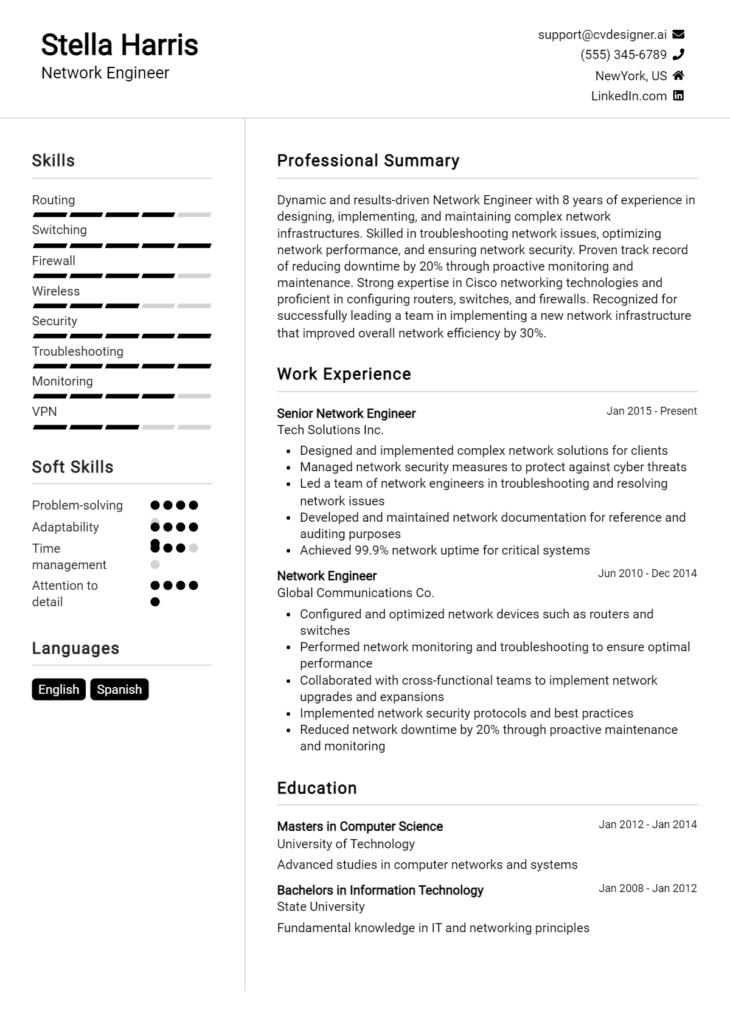Most Popular Network Analyst Resume Examples
Explore additional Network Analyst resume samples and guides and see what works for your level of experience or role.
As a Network Analyst, you play a pivotal role in ensuring the seamless operation and security of an organization’s network infrastructure. Your expertise not only supports day-to-day operations but also safeguards sensitive data against potential threats. Given the technical nature of this role, having a well-crafted resume is essential to showcase your skills and experience effectively. A compelling resume can be the difference between landing an interview and getting lost in the applicant pool. In this article, we will guide you through the intricate process of resume writing specifically designed for Network Analysts.
We will delve into the key responsibilities and skills that potential employers seek, helping you align your qualifications with industry standards. You'll discover the best formats to use for your resume, ensuring clarity and professionalism. We will also highlight common mistakes to avoid that could hinder your chances of being noticed. To assist you further, we will provide resume examples tailored for all experience levels, from entry-level to seasoned professionals. Additionally, we will share essential tips on crafting an impactful resume and selecting the right templates that resonate with hiring managers. By the end of this guide, you’ll be equipped with the knowledge to create a standout resume that truly reflects your capabilities as a Network Analyst.
Key Responsibilities and Skills for a Network Analyst
A Network Analyst plays a crucial role in maintaining and optimizing an organization's network infrastructure. Their primary responsibilities include monitoring network performance, analyzing network issues, and implementing solutions to ensure a reliable and efficient network environment. They work closely with IT teams to design and support network configurations, troubleshoot connectivity problems, and manage network security protocols.
Key Responsibilities:
- Monitor and analyze network traffic and performance metrics.
- Troubleshoot and resolve network issues in a timely manner.
- Configure and maintain network devices such as routers, switches, and firewalls.
- Collaborate with IT staff to design and implement network upgrades and changes.
- Ensure network security through regular audits and updates.
- Document network configurations, changes, and procedures for future reference.
- Provide support and training to end-users on network-related issues.
Essential Skills:
- Proficiency in network protocols (TCP/IP, DNS, DHCP, etc.).
- Strong analytical and problem-solving abilities.
- Experience with network monitoring tools and software.
- Knowledge of network security practices and technologies.
- Familiarity with various networking hardware and devices.
- Excellent communication and teamwork skills.
- Ability to manage multiple tasks and projects simultaneously.
When crafting your resume, it’s vital to highlight these skills effectively in the skills section. Tailoring your listed responsibilities and skills to align with the specific job description will make your application stand out to potential employers. Additionally, consider how these skills could enhance your CV, showcasing your qualifications and making a strong case for your candidacy in a competitive job market.
Best Resume Format and Structure for a Network Analyst
When crafting a resume for a Network Analyst position, it's essential to choose a format that highlights your technical skills, relevant experience, and professional achievements. Here’s a detailed guide on the best resume format and structure for a Network Analyst:
Contact Information
Begin your resume with your full name, phone number, email address, and LinkedIn profile or personal website (if applicable). Ensure this section is clear and easy to read, as it's the first thing potential employers will see.
Professional Summary
Write a concise professional summary (2-3 sentences) that captures your career highlights, relevant experience, and key skills. Tailor it to emphasize your expertise in network design, troubleshooting, and analysis. This section should give hiring managers a snapshot of your qualifications and what you can bring to the company.
Work Experience
This section should be detailed and structured in reverse chronological order (most recent job first). For each position, include the following:
- Job Title
- Company Name
- Location (City, State)
- Dates Employed (Month/Year – Month/Year)
- Bullet points outlining your responsibilities and achievements. Use action verbs and quantify your accomplishments whenever possible. For example:
- "Optimized network performance by implementing new routing protocols, resulting in a 20% increase in speed."
- "Conducted regular system audits to ensure compliance with security standards, reducing vulnerabilities by 30%."
Education
List your educational background, including degrees earned, institutions attended, and graduation dates. If you have relevant coursework or honors, feel free to include those as well. If you have a higher degree (e.g., Master’s), you may choose to omit your high school education.
Skills
Create a section dedicated to your technical and soft skills related to network analysis. This can include:
- Technical Skills: Knowledge of networking protocols (TCP/IP, DNS, DHCP), network monitoring tools (Wireshark, SolarWinds), and hardware (routers, switches).
- Soft Skills: Problem-solving, analytical thinking, communication, and teamwork.
Certifications
If you hold any relevant certifications, such as Cisco Certified Network Associate (CCNA), CompTIA Network+, or Certified Information Systems Security Professional (CISSP), list them in this section. Include the certifying body and the date obtained. Certifications can set you apart and show your commitment to professional development.
Tips for Formatting
- Font and Size: Use a professional font like Arial or Calibri in size 10-12 for body text and slightly larger for headings.
- Margins: Keep margins between 0.5 to 1 inch to ensure your resume is not overcrowded.
- Length: Aim for one page unless you have extensive experience (10+ years), in which case two pages are acceptable.
- Consistency: Maintain consistent formatting throughout all sections, including bullet points, font styles, and spacing.
Complementing Your Cover Letter
The format you choose for your resume should complement your cover letter format. Both should have a similar design, font, and overall aesthetic to create a cohesive application package. Use the same header style for both documents, and ensure your contact information is consistent. In the cover letter, refer to specific experiences and skills mentioned in your resume to create a narrative that showcases your fit for the Network Analyst role.
By following this structured approach and utilizing a clean, professional layout, your resume will effectively showcase your qualifications and make a strong impression on potential employers.
Writing Tips and Best Practices for a Network Analyst Resume
When crafting a resume for a Network Analyst position, it’s essential to present your skills and experiences in a clear, impactful manner. Your resume should not only highlight your technical abilities but also demonstrate your problem-solving skills and achievements in network management. Be sure to tailor your resume to the specific job description, using relevant industry terminology to showcase your expertise. Incorporating resume writing tips can greatly enhance the professionalism of your document, making it visually appealing and easy to read. Remember, these best practices also apply when drafting a cover letter, allowing you to create a cohesive application package.
- Use action verbs such as "analyzed," "implemented," and "optimized" to convey your contributions effectively.
- Quantify your achievements where possible, such as "reduced network downtime by 30%," to provide concrete evidence of your impact.
- Include industry-specific keywords and phrases to pass through Applicant Tracking Systems (ATS) and grab the attention of hiring managers.
- Highlight relevant certifications, such as CCNA or CompTIA Network+, to emphasize your qualifications.
- Structure your resume with clear sections: Summary, Skills, Experience, and Education for easy navigation.
- Keep your resume to one or two pages, focusing on the most relevant and recent experiences.
- Proofread thoroughly to eliminate any grammatical errors or typos, ensuring a polished professional image.
- Tailor each resume submission to the specific job you are applying for, reflecting the unique requirements and responsibilities outlined in the job posting.
Common Mistakes to Avoid in a Network Analyst Resume
When crafting a resume for a Network Analyst position, it's crucial to present your skills and experiences effectively to stand out to potential employers. However, many candidates fall into common pitfalls that can undermine their chances of landing an interview. By avoiding these mistakes, you can ensure your resume highlights your qualifications and aligns with what hiring managers are looking for. Here are some common mistakes to avoid:
- Overloading the resume with excessive information, making it difficult to read.
- Using generic descriptions instead of specific accomplishments and skills.
- Failing to tailor the resume to the specific job description.
- Ignoring the importance of formatting and organization, leading to a cluttered appearance.
- Including irrelevant work experience or outdated skills.
- Using jargon or technical terms without explanation, which may confuse non-technical reviewers.
- Neglecting to highlight relevant certifications and training related to network analysis.
- Making grammatical errors or typos that detract from professionalism.
- Not including measurable achievements, such as percentage improvements or time saved in projects.
- Skipping a summary statement that encapsulates your expertise and career goals.
For more guidance on avoiding these errors, consider reviewing the common mistakes to avoid in a resume. Additionally, don’t overlook the importance of a strong cover letter; check out the common cover letter mistakes to ensure your application is as compelling as possible.
Sample Network Analyst Resumes
As a Network Analyst, your resume is a crucial tool to showcase your skills, experience, and qualifications in the ever-evolving field of network management and support. Below are three sample resumes tailored for different stages of a Network Analyst career: one for an experienced professional, one for an entry-level candidate, and one for a career changer. These examples highlight key competencies, relevant experiences, and educational backgrounds that can help you stand out to potential employers. For further inspiration, feel free to explore more resume templates and consider pairing your resume with corresponding cover letter examples to create a comprehensive job application package.
Experienced Professional Resume
John Doe
123 Networking Lane
Tech City, ST 12345
(123) 456-7890
john.doe@email.com
Summary
Results-driven Network Analyst with over 7 years of experience in designing, implementing, and managing networks. Proven ability to optimize network performance and security. Strong analytical skills and expertise in troubleshooting complex networking issues.
Professional Experience
Senior Network Analyst
XYZ Tech Solutions, Tech City, ST
March 2018 – Present
- Lead a team of 5 in the design and implementation of enterprise-grade network solutions.
- Conduct regular network performance assessments to ensure optimal operation and reliability.
- Collaborate with security teams to develop and enforce network security protocols, reducing potential vulnerabilities by 30%.
- Document network configurations and changes to maintain an accurate inventory of network resources.
Network Analyst
ABC Corporation, Tech City, ST
June 2015 – February 2018
- Monitored and maintained local and wide area networks for over 500 users.
- Resolved 95% of network-related issues within the first call, improving help desk response time.
- Assisted in the rollout of new network infrastructure, resulting in a 40% increase in system performance.
- Provided training to junior analysts on network monitoring tools and best practices.
Education
Bachelor of Science in Computer Networking
University of Tech, Tech City, ST
Graduated: May 2015
Certifications
- Cisco Certified Network Associate (CCNA)
- CompTIA Network+
Entry-Level Candidate Resume
Jane Smith
456 Technology Drive
Innovation Town, ST 67890
(987) 654-3210
jane.smith@email.com
Summary
Detail-oriented recent graduate with a Bachelor’s degree in Computer Networking seeking a Network Analyst position. Strong foundational knowledge in network configuration and security practices. Eager to apply theoretical knowledge in a practical environment.
Education
Bachelor of Science in Computer Networking
Tech University, Innovation Town, ST
Graduated: May 2023
Relevant Coursework
- Network Security
- Routing and Switching
- Network Design and Management
- Wireless Networking
Internship Experience
Network Intern
Tech Innovations, Innovation Town, ST
January 2023 – April 2023
- Assisted in the monitoring and maintenance of network performance for a mid-sized company.
- Supported the implementation of new security measures, contributing to a 15% reduction in unauthorized access attempts.
- Documented network configurations and provided technical support to staff and clients.
Skills
- Proficient in Cisco routers and switches
- Familiar with network monitoring tools (Wireshark, SolarWinds)
- Strong problem-solving and analytical skills
- Excellent communication and teamwork abilities
Career Changer Resume
Michael Johnson
789 Digital Ave
New City, ST 34567
(321) 654-9870
michael.johnson@email.com
Summary
Dynamic professional transitioning from IT support to Network Analyst. Over 5 years of experience in troubleshooting and resolving technical issues. Strong knowledge of networking principles and a passion for enhancing organizational efficiencies through technology.
Professional Experience
IT Support Specialist
Digital Solutions Inc., New City, ST
March 2018 – Present
- Provided technical support and troubleshooting for a diverse range of hardware and software issues, enhancing user satisfaction by 25%.
- Collaborated with network teams to identify and resolve connectivity issues reported by staff.
- Assisted in the development of IT training materials, improving the onboarding process for new employees.
Help Desk Technician
Tech Support Co., New City, ST
January 2016 – February 2018
- Supported end-users with desktop and network-related issues, resolving inquiries in a timely manner.
- Conducted routine network monitoring and maintenance tasks under the supervision of senior analysts.
Education
Bachelor of Arts in Information Technology
Tech State University, New City, ST
Graduated: December 2015
Certifications
- CompTIA A+
- CompTIA Network+ (in progress)
Skills
- Familiar with TCP/IP, DNS, and DHCP protocols
- Strong troubleshooting and analytical skills
- Excellent verbal and written communication skills
- Team player with a proactive approach to problem-solving
These samples illustrate the diverse paths one can take in a career as a Network Analyst. Tailoring your resume to highlight relevant skills and experiences will significantly enhance your chances of landing the desired role.
Checklist for a Network Analyst Resume
- Proofread for Typos and Errors: Carefully read through your resume to catch any spelling, grammar, or punctuation mistakes. Consider using tools or software that specialize in grammar checking.
- Check for Consistency: Ensure that your formatting is uniform throughout the document, including font size, style, and bullet point alignment. Consistency in headers and sections is crucial for a professional appearance.
- Tailor Your Resume: Customize your resume for the specific Network Analyst role you’re applying for. Highlight relevant skills and experiences that match the job description.
- Use Action Verbs: Start your bullet points with strong action verbs to convey your accomplishments and responsibilities effectively. Examples include "analyzed," "implemented," and "managed."
- Quantify Achievements: Where possible, include numbers or percentages to quantify your achievements. This provides concrete evidence of your impact and capabilities.
- Highlight Relevant Skills: Make sure to include both technical and soft skills relevant to the Network Analyst position, such as networking protocols, troubleshooting, and communication skills.
- Keep It Concise: Aim for a one-page resume unless you have extensive experience. Be concise and focus on the most relevant information to avoid overwhelming the reader.
- Include Certifications: List any relevant certifications that may enhance your qualifications, such as CompTIA Network+, Cisco CCNA, or any other industry-recognized credentials.
- Update Contact Information: Double-check that your contact details are current and correct. Include a professional email address and a phone number where you can be easily reached.
- Consider Using an AI Resume Builder: Utilize an AI resume builder to ensure that all elements are well-organized and visually appealing. This can help you present your qualifications in the best light.
A similar checklist can also be followed for creating a CV or cover letter.
Key Takeaways for a Network Analyst Resume Guide
Creating a strong resume as a Network Analyst is essential to standing out in a competitive job market. By utilizing the examples and tips provided, you can effectively showcase your skills, experience, and qualifications to potential employers. Don't forget to download a professionally designed template from resume templates to give your resume a polished look. Additionally, consider using our tailored cover letter templates to complement your application. If you're looking for a more customized approach, our best resume maker can help you create a standout resume that captures your unique career story. Remember, following similar guidelines will also assist you in crafting a compelling CV and an engaging cover letter. Take the next step in your career journey by applying these strategies today!
